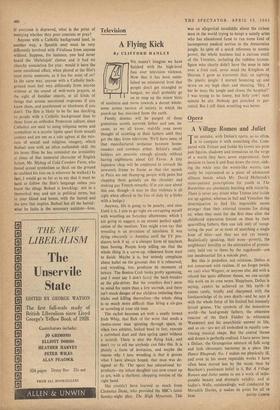Opera A Village Romeo and Juliet
THE mistake, with Delius's opera, as so often, I is to compare it with something else. Com- pared with Tristan and Isolde his lovers are poor pale figures, shadowy and tremulous on the verge of a world they have never experienced; their decision to leave it and float flown the river, sink- ing the while into the womb-like waters, can easily be represented as a piece of adolescent silliness beside which Mr. David Holbrook's moist-palmed prescriptions for youth in The Borderline are absolutely bursting with maturity. There is never any doubt what Tristan and lsolde are up against, whereas in Sall and Vrenchen the determination to find life impossible seems stronger than their external reasons for doing so; when they meet for the first time after the childhood separation forced on them by their quarrelling fathers, they can talk only of 'recap- turing the past' or at most of snatching a single hour of bliss—and they are not yet twenty. Realistically speaking, their woes—poverty, the neighbours' hostility or the alternative of promis- cuity held out to them by the vagabonds—are too insubstantial for a suicide pact.
But this is prejudice, not criticism. Delius is not concerned with realism. If we forget (while we can) what Wagner, or anyone else, did with a related but quite different theme, we can accept this work on its own terms. Happiness, Delius is saying, cannot be achieved on this earth—it comes rarely, briefly and sharpened with the foreknowledge of its own death—and he says it with the whole force of his limited but intensely lyrical genius. The symbols of the insensitive world—the land-greedy fathers, the obsessive rancour of the Dark Fiddler (a whimsical Wanderer) and his anarchistic answer to life, and so on—are not all embodied in equally con- vincing musical shape. But the central theme and dream is perfectly realised. I have never been a Delian; the Graingerian mixture of folk song and lush chromatic harmony in a piece like Dance Rhapsody No. I makes me physically ill, and even in his more reputable works I have often been moved less by the music than by Beecham's passionate belief in it. But A Village Romeo and Juliet seems to me a work of indis- putable beauty and dramatic validity; and at Sadler's Wells, outstandingly well conducted by Meredith Davies, it makes its point for all to


































 Previous page
Previous page